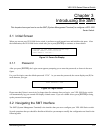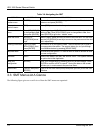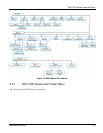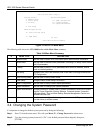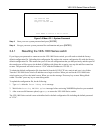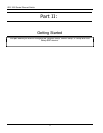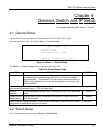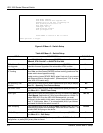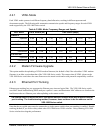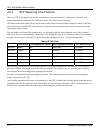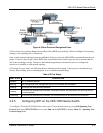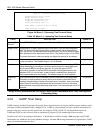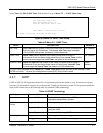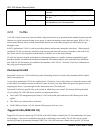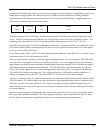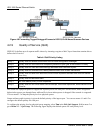
VES-1000 Series Ethernet Switch
General, Switch and IP Setup 4-3
4.2.1 VDSL Mode
Each VDSL mode operates in a different frequency band allocation, resulting in different upstream and
downstream speeds. The following table summarizes transmission speeds and frequency ranges for each VDSL
mode supported by the VES-1000 Series switch.
Table 4-C VDSL Mode, Frequency Ranges and Speeds
VDSL MODE FREQ. RANGE (Hz) LINE SPEED (Mbps)
10 Base-S
Upstream 4.0M 7.9M 1.56 6.25 9.38 12.50 18.75
Downstream 900K 3.0M 4.17 6.25 8.33 12.50 16.67
ANSI/ETSI Plan 998
Upstream 4.0M 5.0M 1.56 3.13 6.25
Downstream 900K 3.0M 4.17 6.25 8.33 12.50 16.67
ETSI Plan 997
Upstream 4.0M 5.0M 1.56 3.13 6.25
Downstream 900K 2.7M 4.17 6.25 9.38 12.50
4.2.2 Modem Firmware Upgrade
This option enables the uploading of VDSL modem firmware (the default is No) if the subscribers VDSL modem
firmware is an older version than that of the VES-1000 Series switch. This ensures that all VDSL clients on the
VES-1000 Series switch have the same firmware as the actual switch and avoids potential compatibility conflicts.
4.2.3 Ethernet Port Trunking
Ethernet port trunking lets you aggregate the Ethernet ports into one logical link. The VES-1000 Series switch
uses MAC-based load balancing which analyzes a packet’s source and destination MAC addresses to distribute the
load between the two Ethernet ports when uplinking to the remote switch.
The remote switch to which the VES-1000 Series switch connects must also support Ethernet
port trunking. The load-balancing method, however, does not have to be the same as on the
VES-1000 Series switch.
Note that the two uplink ports must be connected to a single remote switch when port trunking is enabled. Disable
trunking (default) if you wish to daisy-chain other VES-1000 Series VDSL switches. Daisy-chaining VES-1000
Series switches does degrade performance.



